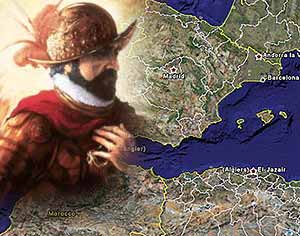September 28, 2007 (the date of publication in Russian)
Alexei Chichkin
THE LEGACY OF THE CONQUISTADORS
Spanish territories in Africa constitute a sanitary cordon between Madrid and Rabat
 Spain, a powerful empire in the period of the Habsburg dynasty's reign, has lost by today most of its numerous colonies. Still, Madrid is persistently keeping control over seven territories in Morocco, which actually separate this country from the Mediterranean Sea. These territories are the remains of what once was the Spanish Northern Morocco which reunified with the kingdom of Morocco in 1957-1958. However, the importance of those territories for Madrid shouldn't be underestimated.
Spain, a powerful empire in the period of the Habsburg dynasty's reign, has lost by today most of its numerous colonies. Still, Madrid is persistently keeping control over seven territories in Morocco, which actually separate this country from the Mediterranean Sea. These territories are the remains of what once was the Spanish Northern Morocco which reunified with the kingdom of Morocco in 1957-1958. However, the importance of those territories for Madrid shouldn't be underestimated.
The districts of Ceuta, Melilla, Torres de Alcala (Torres el Kal'a), along with the islands of Perejil, Penon de Alhucemas, Chafarinas and Penon de Velez de la Gomera constitute a territory of almost 800 square kilometers. They are under supervision of the Spain's Ministry of Defense and Ministry of Interior. The population comprises around 160,000 people, 85% residing in mainland enclaves, the largest of them being Ceuta (450 sq. km, with a population of over 90,000).
It is noteworthy that these territories are not an analogue of Gibraltar, which is actually a British offshore territory, though with military and naval bases. They rather constitute a sanitary cordon separating Spain from the African Maghreb. The Spanish military and police severely crack upon illegal immigrants into Europe, who try to use these territories as a transfer station.
Ceuta also plays a significant role in fuel exports. Its territory is crossed by oil and gas pipelines, connecting the Pyreneans with Algeria. By the end of 2007, the European Union is supposed to approve the project of a transport corridor (including both highway and railway routes) across the Gibraltar Strait. Actually, the corridor is going to connect not Spain and Morocco but Gibraltar with Spain's Ceuta.
Already today, the major passenger route between Africa and Spain is crossing the Spanish enclaves of Morocco. Transit of Moroccan cargo, as well as goods from other African states, as well as the reverse transit, brings annual income of 120-140 million euros. It is noteworthy that almost all of the railroads of Northern Morocco, by 30% owned by Spain, lead to Ceuta and Melilla.
The military strategic role of Spanish enclaves is equally significant. Spain's military and intelligence facilities on these territories allow Spain – and therefore NATO – to control the military political situation in Maghreb and the transit routes between the Mediterranean and the Atlantic.
As far back as in 1965-66, some of these territories were used for training Algerian guerillas, involved in the conspiracy against the regime of Ahmed Ben Bella. Quite recently, in spring 2007, the same territories were used by France for projection of its troops to Cote d'Ivoire.
NATO's military supplies for Morocco for the purpose of oppression of POLISARIO national movement in Western Sahara (a Spanish colony till November 1975) are also shipped across these territories.
In 1974, Spain, Morocco and Mauritania agreed on division of Western Sahara between the two African states, but eventually, Mauritania gave up its claims. In 1985, this country officially recognized the sovereign status of the Sahara Arab Democratic Republic established by POLISARIO. In this situation, Spain officially supported Morocco – which until today, in terms of international law, is occupying Western Sahara. In exchange, Morocco gave up support of the separatist movement of Kayaks on Canary Isles, which are, according to Rabat, a territory of Morocco. Still, the territory of the Canaries is still regarded as a "historical territory of the Moroccan nation" in Rabat-issued school textbooks, though this expansionism does not overstep those declarations.
Spain's assistance to Morocco in the war in Western Sahara has served for a long time as a bargaining chip in the debate over Spanish enclaves in North Africa as well. Moroccan kings and prime ministers of 1990s claimed that the immediate extension of Rabat's suzerainty to these territories is not a priority task of the state.
However, in 2002 and repeatedly in 2005, Morocco "showed its teeth". Moroccan commandoes made an attempt to overtake Spain's isle of Perejil. They deployed a tent village on the isle, raising their national flag. However, Spanish ships approached within hours, capturing the guests and conveying them back. This operation involved assistance from the United States.
It is noteworthy that in the periods of exacerbation of the conflict between Spain and Morocco, martial law was introduced on Gibraltar as well. London expressed support for its NATO partner. In its turn, Spain does not officially express its claims on Gibraltar. The League for Gibraltar's Reintegration, founded by Franquists in 1942, is long forgotten.
Still, the powers of Spain and Morocco are likely to continue to perform the role of an aggressor and a victim in order to soothe the public opinion of their countries. Moreover, beside the domestic political effect, Rabat may use the territorial debate with Spain as a tool for hammering out additional preferences from the EU – e.g., amortization of Morocco's foreign debt and options for new privileged borrowings.
Number of shows: 1940
 ENG
ENG 

 ENG
ENG 
